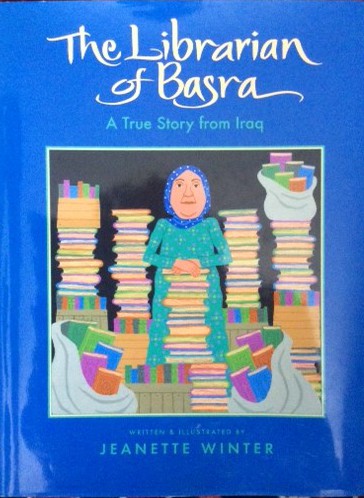Inspiring Young Readers
 posted on 10 Nov 2015
posted on 10 Nov 2015
The Librarian of Basra by Jeanette Winter
This is a picture book loaded with so many meanings but one that is also lavishly illustrated and clearly written by Jeanette Winter who is is a well established American writer and illustrator. It tells the true story of Alia Muhammad Baker, a middle aged female librarian in Basra, 'a port city in the sand -swept country of Iraq' who responds to the rumours of impending war by secretly moving the books from the city library where she works and hiding them in a safe place.
There is a beautiful quiet balance between the written text and the pictures that are laid out almost as if in a family photo album. The vividly coloured illustrations depict ordinary lives where people meet in the library to read, learn and talk about important matters, as they do all over the world. Part of their discussion is about what to do if war breaks out as expected and the biggest concern of the librarian is that a plan needs to be put in place to protect the books ' which are more precious to her than mountains of gold'. When her concerns are ignored by those in charge, she takes matters into her own hands and in the process becomes the heroine of the story. Soon 'the whispers of war become louder' and the landscape changes to one of terrible explosions, fire and destruction. Left alone to protect the library, she persuades her friend who owns a nearby restaurant to help her. Eventually this becomes a task for all the community to help with and they work together to shift as many books as possible.
As we turn the pages we see that the library is indeed burned to the ground and the books are temporarily hidden in the restaurant. This is a dangerous enterprise below the official radar but Alia remains concerned about the fate of the remaining thirty thousand books. She goes on to co ordinate another difficult move which disperses them into lots of different houses. I love the pictures where we see the inside of her own house with books in piles, boxes and bags on and under every available surface. It is very difficult to depict time passing as the war progresses but Winter does this skilfully in a dramatic double page spread. We see the sad, stoical resignation on Alia's face as buildings explode and tanks fire across the dark red background. Several planes and drones roar across the flame filled sky - words are unnecessary.
In contrast we see her on the next pages with closed eyes dreaming of peace and tranquillity with symbolic doves flying above a river against a background suffused with blue. Then onto an optimistic glimpse of a new beginning when the war is over shows a splendid new library set squarely in the middle of an orderly, symmetrical decorative page. The final statement is so strong as she stands determinedly and defiantly with piles of books all about her. This image on the final page is the one chosen for the book cover and I think is the right one because of its fierceness.
This is a frightening book because although we are hugely sympathetic we know that it is showing us only a partial, stylised version of the wartime horrors that are still not over in Iraq and the surrounding region. The strong colours and repeated patterns used by the illustrator are resonant of middle eastern art and the solid figures are familiar yet strange. This is a part of the world that we too often see reduced via news bulletins that do not show us the complexity of the lives of ordinary people battling every day to retain dignity and hope. Winter has managed to covey beauty amidst the destruction and hope despite the despair.
Part of the proceeds of this fine book go towards making Alia's dream come true by rebuilding the collection of Basra's Central Library. I believe it to be a profound, deceptively simple book about the love of literature and the power of ordinary people in resisting oppression. As such it deserves to be read more widely by readers of all ages.
Karen Argent
10th November 2015